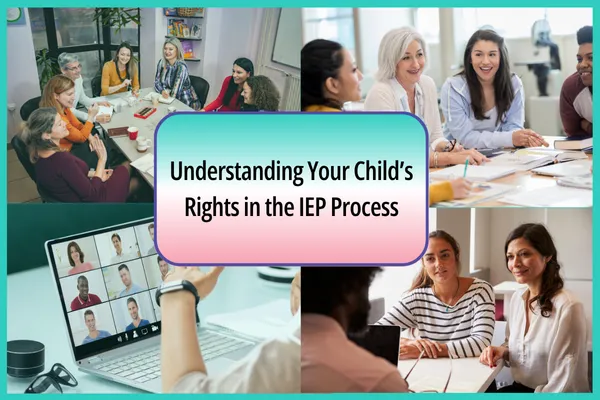
Understanding Your Child’s Rights in the IEP Process
Introduction Every parent of a child with special needs should know: you and your child have rights protected by federal law. Understanding these rights is crucial not only for advocacy but also for ensuring that your child receives the support they deserve. This blog breaks down the essential rights you need to know throughout the IEP process.
Right to Free Appropriate Public Education (FAPE) Under the Individuals with Disabilities Education Act (IDEA), your child is entitled to a Free Appropriate Public Education. This means they must receive education and services designed to meet their individual needs at no cost to you. FAPE includes access to the general education curriculum and accommodations to support learning.

Right to an Evaluation If you or a teacher suspects your child has a disability that affects learning, you have the right to request a formal evaluation. The school must respond promptly and conduct the assessment at no cost. You also have the right to:
Consent to or refuse evaluations.
Receive results in understandable language.
Seek an Independent Educational Evaluation (IEE) if you disagree with the school’s findings.
Right to Participate in the IEP Process You are a full and equal member of your child’s IEP team. This gives you the right to:
Attend IEP meetings.
Receive advance notice of meetings.
Have the meeting scheduled at a mutually agreeable time.
Share input about your child’s strengths, needs, and goals.
Invite advocates or specialists to attend.

Right to Written Notice and Consent Before the school takes any action related to your child’s education—such as changing services, placement, or eligibility—they must give you Prior Written Notice. You must also give written consent for initial evaluations and initial provision of special education services.
Right to Access Educational Records You have the right to review and request copies of your child’s educational records. If you find inaccuracies or incomplete information, you can request amendments.
Right to Dispute Resolution If disagreements arise, you have options for resolution:
Mediation: A voluntary, collaborative process with a neutral third party.
Due Process Complaint: A formal legal process where an administrative law judge hears the case.
State Complaint: A written complaint submitted to your state’s education department.
Right to Least Restrictive Environment (LRE) Your child has the right to be educated with peers without disabilities as much as possible. Schools must consider supplementary aids and services before placing a child in a more restrictive setting.
Empowerment Through Advocacy Knowledge is power. The more you understand your rights, the more effectively you can advocate for your child. When you know the law, you are better equipped to hold schools accountable and ensure your child’s needs are met.
Checkout my course: THE ENLIGHTENED IEP COURSE
Conclusion Your child’s educational journey should be rooted in collaboration, respect, and legal protections. By knowing your rights, you not only safeguard your child’s future but also become a stronger, more confident advocate. When in doubt, seek support—there are many organizations ready to help you stand up for what your child deserves.

